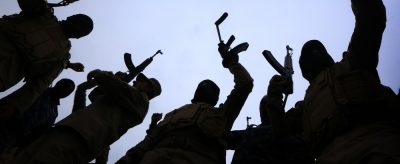US Military Sent over $1 Billion Worth of Light Weapons To “Multiple Armed Groups” in Iraq, including ISIS and Al Qaeda
Report of Amnesty International

Management and Logistical Failure? Quoting a recently declassified US government audit, Amnesty International reports that the US Army “has failed to keep tabs on more than $1 billion worth of arms and other military equipment” channelled to Iraq under the Iraq Train and Equip Fund (ITEF).
In 2015, US Congress appropriated $1.6 billion for the ITEF program. The funds were earmarked to fight against the ISIS in response to Obama’s counter-terrorism campaign launched in Summer of 2014. In a bitter irony, a large number of these weapons landed up in the hands of terrorists including the ISIS.
The 1.6 billion were spent on light weaponry. It’s all for a good cause: The shipments of weapons and ammunition were according to reports dispatched to Iraq (c/o the Iraqi Armed Forces) to be distributed to armed groups involved in fighting ISIS-Daesh.
Some of the shipments unfortunately went astray or landed in the wrong hands, according to Patrick Wilcken, an Amnesty researcher on International’s Arms Control and Human Rights. This was attributable to “US Army’s flawed – and potentially dangerous – system for controlling millions of dollars’ worth of arms transfers to a hugely volatile region.”
“[The report] makes for especially sobering reading given the long history of leakage of US arms to multiple armed groups committing atrocities in Iraq, including the armed group calling itself the Islamic State.” (Amnesty International, May 24, 2017)
The transfers, which include tens of thousands of assault rifles (worth USD$28 million), hundreds of mortar rounds and hundreds of Humvee armoured vehicles, were destined for use by the central Iraqi Army, including the predominantly Shi’a Popular Mobilisation Units, as well as the Kurdish Peshmerga forces.
While acknowledging the billion dollar trade in light weaponry, Amnesty does not beg the question: Why were these tens of thousands of weapons sent to Iraq in the first place? What objectives are being served?
Amply documented, the US and its allies are supplying weapons, training and military equipment to numerous Al Qaeda affiliated rebels (including ISIS) acting on behalf of their State sponsors.
According to Amnesty, the sending of weapons to multiple rebel groups is justified. The killing of civilians is not an issue. The failures of the US Army outlined in the DoD report pertain to errors in monitoring, delivery, record-keeping and human error:
The DoD audit found several serious shortcomings in how ITEF equipment was logged and monitored from the point of delivery onward, including:
- Fragmentary record-keeping in arms depots in Kuwait and Iraq. Information logged across multiple spreadsheets, databases and even on hand-written receipts.
- Large quantities of equipment manually entered into multiple spreadsheets, increasing the risk of human error.
- Incomplete records meaning those responsible for the equipment were unable to ascertain its location or status.
Amnesty fails to acknowledge that the Pentagon has been channelling weapons to jihadist armed groups as part of carefully designed military agenda with a view to destabilizing Iraq as a nation state.
Amply documented, the ISIS and other terror groups have been receiving weapons from both the US and its allies including Turkey, Saudi Arabia and Qatar. And a significant part of the $1.6 billion has been used to finance weapons shipments to the ISIS, both directly as well as indirectly through third parties.
Amnesty casually places the blame on the Iraqi Armed forces: “Lax controls and record-keeping within the Iraqi chain of command” has resulted in the weapons falling in the wrong hands. According to AI:
[weapons] manufactured in the USA and other countries wind up in the hands of armed groups known to be committing war crimes and other atrocities, such as IS, as well as paramilitary militias now incorporated into the Iraqi army.
What Amnesty fails to mentioned is these paramilitary groups which are committing countless atrocities are directly or indirectly supported by the US.
The good news, however, according to Amnesty is that “In response to the audit, the US military has pledged to tighten up its systems for tracking and monitoring future transfers to Iraq.”
According to AI, the US is not in any way complicit in human rights violations by dispaching weapons to multiple armed groups which they finance and control. According AI’s Patrick Wilken, it’s the result of poor management and lack of “check ups and controls”:
“This should be an urgent wake-up call for the US, and all countries supplying arms to Iraq, to urgently shore up checks and controls. Sending millions of dollars’ worth of arms into a black hole and hoping for the best is not a viable counter-terrorism strategy; it is just reckless,” said Patrick Wilcken.
“Any state selling arms to Iraq must show that there are strict measures in place to make sure the weapons will not be used to violate rights. Without these safeguards, no transfer should take place.”
Why were these weapons sent to Iraq in the first place?
Amnesty International is urging the USA to comply with the Leahy Law, which prohibits the supply of most types of US military aid and training to foreign security, military and police units credibly alleged to have committed “gross human rights violations”.
What nonsense. Amnesty does not address the issue of State sponsorship of terrorism, namely human rights committed on behalf of the state sponsors of terrorism. According to AI: “The USA and Iraq must also accede to the global Arms Trade Treaty, which has strict rules in place to stop arms transfers or diversion of arms that could fuel atrocities.”
Featured image: Amnesty International

